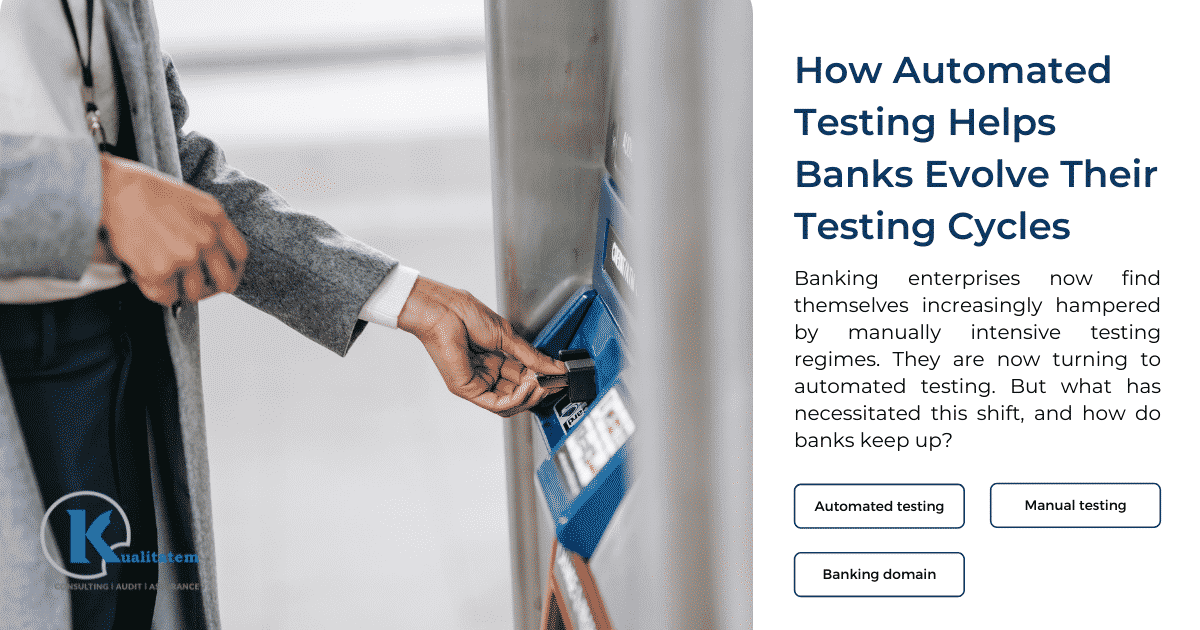How Automated Testing Helps Banks Evolve Their Testing Cycles

- September 7, 2021
- maira
Banking enterprises now find themselves increasingly hampered by manually testing-intensive regimes. The pressure to adapt to changing market trends has resulted in the need to invest in quality development at speed and scale, which in turn has occurred in the shift to automated testing. But what has necessitated this shift, and how do banks keep up?
The Current Crisis in Banking
When the pandemic first hit globally, banks had to go fully virtual in a matter of weeks. COVID-19 accelerated the digital transformation of banks, and Deloitte’s 2021 analysis for US banking showed that institutions that had made strategic investments in technology came out stronger.
To respond to this crisis, rapid changes are required: test automation needs to incorporate technologies, such as analytics and machine learning, to balance speed and quality.
It is therefore impertinent for banks to understand how intelligent test automation defines the journey towards being a mature organization.
Here’s how.
Through rigorous automated testing in banking software, you can ensure that:
- Sensitive data is protected while executing activities
- Financial guidelines are followed
- Laws and regulations are strictly enforced with each transaction
- The banking application and its infrastructure is prepared to handle the transaction load without issue
- The banking software is secure and equipped to prevent fraud, hacking and other cyber-attack attempts
It’s important to establish what should and shouldn’t be automated according to your banking needs. Automated testing isn’t a replacement for manual testing – it’s complementary to it. For instance, automated testing promises to keep you on track for delivering your product, and promising a high-quality user experience while simultaneously fending off cyber-attacks or compromises in customer privacy. That being said, you still need manual testing to ensure the quality of your banking software. Some testing types are:
- Exploratory testing
- Sanity testing
- User interface testing
That’s why, along with ensuring that you’re identifying your system requirements, validate whether your testing framework supports your long-term growth goals.
Where Automated Testing Helps
1. Regression testing
Manual regression testing is incredibly time-consuming. A typical regression suite will involve thousands of test cases and take hours to run – this ends up creating a bottleneck in the release cycle.
Automated tests expedite this process because they’re:
- A one-time investment
- Can be run as many times as needed
- The regression suite can be run at any time, for longer durations of time
- They are executed the same way each time
Organizations that build a machine learning model based on former changes positively impact their existing functionality over time.
2. Test scenario generation
Ideally, a customer should be able to view their savings account, credit card, loan EMI, Mutual Fund Investments etc. all on a single dashboard.
These are most often separate enterprise systems, making it a complex situation to provide security, as well as processes that offer integrated real-time information, to the forefront.
Because most banks are largely on legacy systems, generating test scenarios are impeded by the need for domain knowledge, analytical, and recognizing the appropriate test data. Creating the right set of end-to-end scenarios is challenging.
2.1 Perfect use cases and test cases
Automation testing performs better than manual testing where use cases and test cases are involved. Simply put, it’s because the AI and ML algorithms provide the testing application power to combine experience and market trends to test the application from every perceivable angle.
3. Digital devices = a flood of testing scenarios
At present, consumers take for granted the fact that mobile and web applications is their most convenient mode for banking transactions. Banks have to ensure cross-device and cross-platform workability. With tools like Applitools that are powered by visual testing AI emerging in the market, scriptless and codeless automation is gradually finding its foothold as well – making the shift to automated testing inevitable.
4. Automating performance tests
According to Radware, a 2-second delay in load time during a transaction results in abandonment rates of up to 87%. Given the fact that banking institutions optimally need to be functioning 24/7, performance failures can be notoriously costly for banks. Automating performance tests where possible, for instance when monitoring performance levels or simulating performance scenarios, is one way to optimizing the performance testing process.
If you’re not sure where to start, you can check out our quick guide to performance testing for banks.
5. Security and regulatory compliance
This one isn’t new: banking websites and customer portals are popular targets for cyber-attacks, starting with fraudulent transactions and hacking. Cyber bank robberies alone contribute $1 trillion to global cybercrime losses.
It’s no surprise, then that security test automation is important in financial institutions. Moreover, security test automation is supportive of DevOps principles, whereas DevOps’ compatibility with manual automation still requires human cognitive skills. Given that the banking sector faces well-known stringent regulatory compliance globally, the more obvious choice here is to rely on technologies like Robotic Process Automation (RPA) and Natural Language Processing (NLP) to ensure regulatory compliance.
Like we’ve said before, automated testing isn’t a replacement for manual testing – the technology is still growing. But it does ensure quality at every stage of development by making sure that new developments to your application, infrastructure or software don’t introduce bugs, at significantly reduced cost and time.
If you think you’re ready to implement automation testing in your bank or require testing services for banking and financial testing service, you can explore the automation testing services provided by us. We specialize in automation testing for the banking industry and offer comprehensive solutions to meet your specific needs. Reach out to learn more about our banking and financial testing service.











